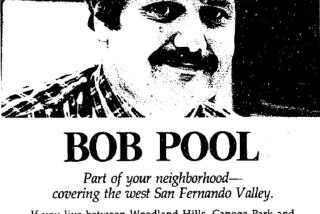He spun yarns into gold
- Share via
LAURIE Powers had only a few hazy memories of her grandfather, the author of the western novel “Doc Dillahay” (1949). When she went through the boxes of papers an aunt had kept, she discovered that her grandfather had been a prolific pulp-fiction writer. Using a variety of pseudonyms, Paul S. Powers (1905-1971) cranked out dozens of stories about cowboy heroes Freckles Malone, Sonny Tabor, Kid Wolf and Johnny Forty-Five for Wild West Weekly and other magazines. She also discovered his autobiography, “Pulp Writer: Twenty Years in the American Grub Street” (University of Nebraska Press: 268 pp., $19.95), which is appearing in print for the first time, 36 years after his death.
Powers says little about his personal life and completely omits his long battle with alcohol (which his granddaughter describes in an introduction). Instead, he provides a lively chronicle of working during the 1930s and ‘40s, the years many fans consider the golden era of pulp fiction. Powers wandered from the ghost towns of Colorado to communities in Arizona, New Mexico and California, gathering material for his fiction, which he banged out with two fingers on a manual typewriter. The arc of Powers’ career followed the magazines he wrote for: The pulps were a favorite American entertainment in the Depression. Paper shortages during World War II precipitated their decline, and they fell victim to competition from comic books and television after the war.
Powers had few illusions about his work: He knew his stories were lightweight entertainments, created to be consumed and discarded in a week’s time. But he also knew they were good, and he took an honest and understandable pride in the 10 million words he estimated that he produced. Powers may not have been a great prose stylist, but he could spin a lively, readable yarn -- as this long-neglected autobiography attests.
-- Charles Solomon
More to Read
Sign up for our Book Club newsletter
Get the latest news, events and more from the Los Angeles Times Book Club, and help us get L.A. reading and talking.
You may occasionally receive promotional content from the Los Angeles Times.










